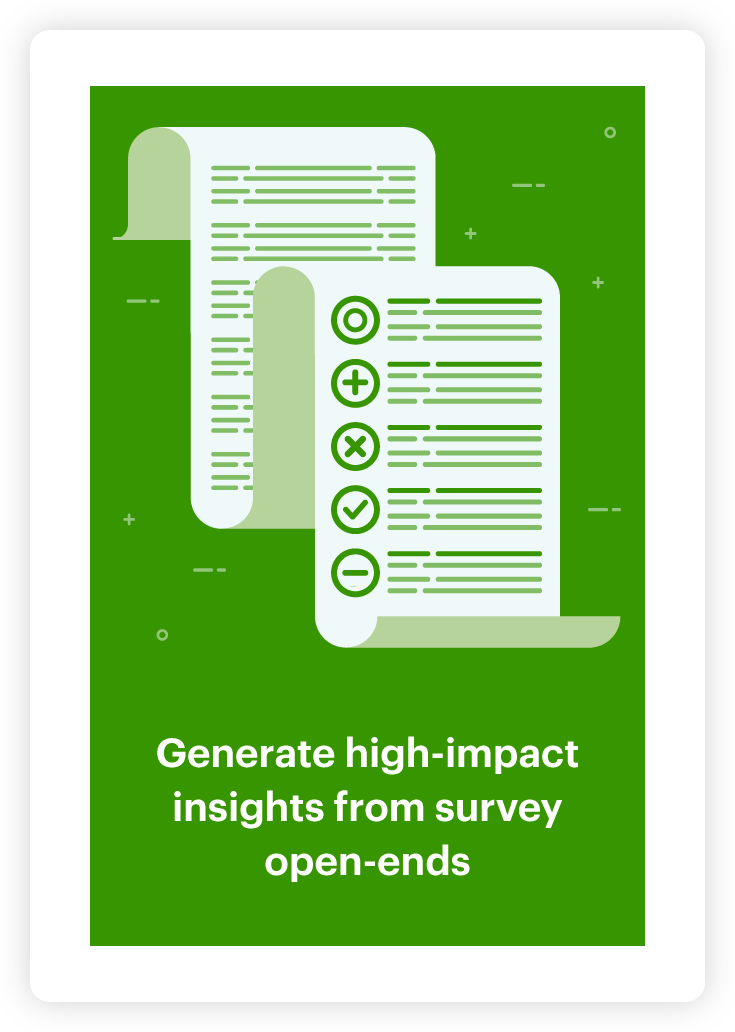Elevating gameday experience through fan experience surveys


Delivering a stadium experience that keeps supporters coming back for more is vital for fan engagement teams. Beyond winning, actioning feedback from fan experience surveys is the best way to ensure sports followers leave stadiums satisfied.
However, analyzing fan surveys is easier said than done. Trying to discern what matters among tens of thousands of responses on a regular basis is a huge undertaking. This is why sports teams are turning to Relative Insight’s survey analysis tool to get to the heart of fan feedback effectively and efficiently.
After hearing how Relative Insight contributed to the Atlanta Falcons’ fan experience success, another football program adopted the platform to derive better insights from its fan experience surveys. By using Relative Insight’s software, the football team quickly determines key areas of improvement.
This example provides a snapshot of the analysis its fan engagement team has undertaken — and how it has implemented fan feedback across its home schedule. The organization hosted games in weeks 5 and 7 of the regular season. After both matchups, it gathered supporters’ views on their stadium experience through an identical post-game fan survey.
The team used Relative Flow to automate the upload and reporting of fan feedback, as well as segmenting its analysis to understand the perspective of different groups of fans. Here, we highlight what the team found and how it incorporated these insights into gameday experience changes.
Gameday experience promoters and detractors in week 5
The team’s fan experience survey incorporates both closed and open-ended questions. Game attendees rate their stadium experience out of 10, then state why they’ve given this score. Relative Insight’s software enabled the program’s fan engagement specialists to segment responses by supporters giving high and low scores in the week 5 survey — promoters and detractors.
Using this segmentation, the team quickly identified what elements of the week 5 gameday experience worked well, as well as what needed improvement.
Fans enjoyed the stadium atmosphere and praised staff for their friendliness. Promoters talked about the former 10.7x more, including using the phrase ‘pure hype’ infinitely more — meaning this didn’t appear in detractors’ comments. The latter overindexed 4.6x more, with promoters using the word ‘friendliness’ infinitely more.
“The atmosphere was hype – everyone was vibing, and it was a blast!“
However, as much as the fan engagement team enjoyed hearing what stadium-goers liked, its main focus was improving areas they disliked. Examining detractors’ feedback revealed three key pain points.
Connectivity impacts stadium experience
The first related to connectivity. Detractors’ fan experience survey responses were 10.0x more likely to highlight the topic of ‘messaging’ and used the word ‘wi-fi’ 36.3x more. Fans complained about being unable to send messages or scroll social media during the game.
“The stadium’s wi-fi was nothing short of a disaster. In this day and age, you’d expect decent connectivity, but what we got was abysmal. I couldn’t even load a basic webpage to check the weather, let alone engage in any real-time social media updates. It’s like they were stuck in the dial-up era.“
Fan survey highlights frustrating entry procedures
The second pain point fans raised was around stadium entry. Supporters giving negative scores were 6.1x more likely to talk about stadium ‘security’ and used words relating to ‘misunderstanding’ infinitely more, including ‘confusing’, ‘maze’ and ‘maddening’.
Digging into verbatim feedback highlighted that their complaints surrounded long lines that moved slowly when going through security and entering the venue.
“Getting into the stadium was a hassle with disorganized lines and slow security checks.“
Loud music irritates detractors
While promoters were delighted with the overall stadium atmosphere, detractors’ stadium experience was marred by music. Their fan survey responses used the words ‘loud’ and ‘deafening’ 17.0x more, while this group also talked about ‘music’ 7.2x more. While noise levels were their main complaint, some fans also disliked the stadium soundtrack played in game breaks.
“The music during timeouts was so loud it gave me a headache. It’s a football game, not a rock concert.“
Acting on fan feedback
After uncovering these insights, the organization’s fan engagement team took action ahead of the next home game in week 7. While stadium connectivity was a longer-term issue that couldn’t be addressed within two weeks, the team did seek to rectify issues with entry and loud music.
To resolve the former, ticket buyers for the week 7 fixture were given clear direction in pre-game communications about stadium entry, including the advice on how to pass through security checks speedily. The organization also informed stadium staff about complaints from the last game and reinforced how to speed up flow into the stadium without compromizing safety.
The latter was a simpler fix, with the stadium DJ asked to lower music volume and mix up the tracks they played during breaks.
Week 7 whack-a-mole
After its week 7 game, the fan engagement team again turned to its post-game survey to ascertain how changes had impacted fan experience. To do this, the team used the Relative Insight platform to compare comments from detractors in weeks 5 and 7.
The team’s efforts to improve entry for fans were successful. When comparing both sets of responses, discussion around entry and security overindexed 17.7x more in week 5 fan experience survey responses. This meant that detractors were much less likely to talk about this as an issue when surveyed about the second game — suggesting remedial measures solved the problem.
New stadium experience issues surface
However, despite this success around stadium lines, this comparison revealed new issues. When it came to music, lowering the volume had unforeseen consequences. Negative responses to the week 7 post-game survey continued to center on stadium sound, with respondents this time complaining that the music was too ‘quiet’, using the word infinitely more.
This impacted the entire stadium’s vibe. Week 7 detractors talked about the lack of ‘atmosphere’ 8.4x more, including being infinitely more likely to use the phrase ‘flat atmosphere’. Not only did lowering music volume lead to audibility issues, it detracted from fans’ gameday experience.
“Our time at the stadium was marked by a flat atmosphere that detracted from the overall enjoyment. The subdued energy failed to capture the excitement of the game.“
There were also increasing complaints surrounding stadium staff in week 7. Despite staff friendliness being a key point of emphasis for promoters in week 5, by week 7 detractors were 6.4x more likely to talk about staff behavior.
Respondents were infinitely more likely to remark on a fall in ‘staff friendliness’ and described stadium workers as ‘less welcoming’. They were also infinitely more likely to talk about staff ‘demeanor’ being worse than previous visits.
“There was a disappointing shift in staff friendliness. The less welcoming demeanor was a departure from our previous positive experiences.“
This highlights the whack-a-mole nature of fan survey analysis, with the organization’s fan experience team faced with a new set of challenges to resolve ahead of its next home game in week 10. Throughout the rest of the season, the team will continue to track and resolve issues that arise within fan feedback.
Acting on feedback in fan experience surveys
By repeatedly segmenting and analyzing free-text responses from its fan experience surveys, this football program is iteratively addressing supporters’ pain points.
Since it started using the Relative Insight platform to analyze feedback, the organization’s fan experience scores have increased in a number of areas, including overall gameday experience, quality of facilities and food and beverage options.
Is your organization looking for efficient and effective ways to implement fan feedback? Relative Insight enables you to keep track of all elements of gameday experience, quickly telling you what fans like and dislike — allowing you to create informed strategies that will have a tangible impact on fan experience. Speak to one of our experts to learn how we can help.
